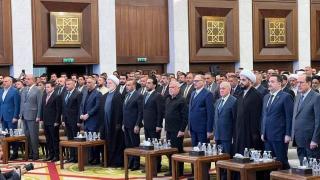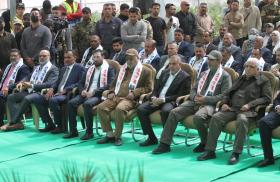Profile: Iraqi Federal Supreme Court
Part of a series: Militia Spotlight: Profiles
or see Part 1: How to Use Militia Spotlight: Profiles
Since 2022, the court has become a channel for Iran-backed militias and terrorist groups to secure “made to order” legal rulings that can have decisive political “lawfare” effects in their favor.
Name: Federal Supreme Court of Iraq (FSC)
Type of movement: In practice, and particularly since 2022, the court has functioned as a political organization controlled by members of Iran-backed political blocs (especially the Badr Organization and Nouri al-Maliki’s State of Law Alliance) as well as the U.S.-designated terrorist groups Asaib Ahl al-Haq (AAH) and Kataib Hezbollah (KH). The FSC routinely delivers rulings that harm Iraqi factions who lean closer to the United States (e.g., the Kurdistan Region and some Sunni leaders), while benefiting Iran-backed political blocs and armed groups and restricting freedom of expression for Iraqis. This has allowed Iran-backed militias to rely on the court for their "lawfare" needs as part of their wider state-capture strategy.
Role: By law, the FSC is the independent Iraqi judicial body that interprets the constitution, determines the constitutionality of laws and regulations, and acts as a final court of appeals. When a case is referred to the FSC, it is examined and submitted to the president of the court.
History and objectives:
- Prior to the October 2005 ratification of the constitution, Article 44 of the Transitional Administrative Law and Law No. 30 of 2005 temporarily established the FSC. Article 92 of the constitution then explicitly required that the FSC be reestablished by passing a new law through a two-thirds majority vote in parliament, which never occurred.
- Law No. 30 of 2005 was amended on March 18, 2021, by a simple majority of 204 members of parliament through the passage of Law No. 25. Yet this vote was legally deficient to alter Law No. 30 of 2005 because Article 92 of the constitution and FSC Decision No. 107 of 2012 required any amendment of FSC-related legislation to be passed by a two-thirds majority in parliament.
- Since 2010, the FSC has been widely criticized for its involvement in politics, from which it is supposed to be independent and nonpartisan. These included very consequential interventions in national politics, such as altering the post-vote government formation process during the 2010 and 2021 general elections, and taking unusual legal steps in early 2022 to pressure and splinter opponents of the Coordination Framework, a powerful coalition of factions that include U.S.-designated terrorist groups like AAH and KH.
- The FSC has been critiqued in both the U.S. Congress and the European Parliament for overtly politicized rulings that negatively affect minorities, from exerting undue political leverage over Kurdish factions to removing Iraq's most prominent Sunni Arab politician, Mohammed al-Halbousi, as speaker of parliament.
- The FSC has been accused of regularly exceeding its authority by ruling on legislative projects that have not been completed or passed by parliament, and by expanding on legal claims made by plaintiffs to take cases in new directions.
- Since 2022, the FSC has proven particularly responsive to cases brought by the U.S.-designated terrorist group KH, using its parliamentary bloc, Hoquq. On September 4, 2023, the court overturned a law ratifying the 2012 Iraq-Kuwait agreement on navigation in the Khor Abdullah waterway. The case was brought by Hoquq parliamentarian Saud al-Saedi.
De Facto FSC Leadership and Decisionmaking
- Badr Organization. The balance of evidence suggests that Badr leader Hadi al-Ameri exercises primary influence and control over the head of the FSC, Judge Jassem Mohammed Abboud (see below). Ameri worked with Jassem to get the judge's son, Mohammed Jassem, appointed as governor of their native Diyala province. Indeed, Jassem has been described as Ameri's "pet judge." The Badr Organization is an Iranian-founded Iraqi paramilitary group with close ties to Iranian regime organs and officials. Notably, the U.S. National Defense Authorization Act for Fiscal Year 2024 prohibits Badr from receiving any U.S. funding due to its close links with Tehran.
- Nouri al-Maliki. A second major influence on the FSC is former prime minister Maliki, who is also very close to U.S.-designated terrorist groups such as KH and acts as one of their top agents in political and legal affairs. The balance of evidence suggests that Maliki (via an in-law) can also obtain made-to-order legal rulings from the FSC for his political benefit and that of his partners and clients. One example is the February 2022 ruling against oil exports by the Kurdistan Region, made in coordination with Brig. Gen. Esmail Qaani, the head of Iran's Islamic Revolutionary Guard Corps-Qods Force (IRGC-QF), and Judge Faeq Zaidan, the head of Iraq’s Supreme Judicial Council.
- FSC President Jassem Mohammed Abboud. A joint citizen of Iraq and Belarus, Judge Abboud has been president of the court since 2021. He meets privately with militia and terrorist commanders and publicly with Iranian government officials (e.g., attending the funeral of Iran’s late president Ebrahim Raisi).
Affiliates
- Supreme Judicial Council head Faeq Zaidan. Abboud was elevated by Zaidan, another Iran/militia-backed judge, but the two have since become fierce competitors when they are not collaborating. In May 2024, Zaidan began to overrule Abboud's FSC rulings for the first time.
- Kataib Hezbollah. The FSC has ruled in favor of KH-submitted requests, for instance when the militia and its partners sought to cancel the 2012 Iraq-Kuwait agreement on navigation in the Khor Abdullah waterway.
- Asaib Ahl al-Haq. AAH has influenced the court's rulings on some political matters, for instance the aforementioned February 2023 ruling against the Kurdistan Region and the November 2023 actions against Speaker Halbousi. Judge Abound also played a prominent role in celebrating the anniversary of AAH's formation on May 4, 2024 (Figure 1). Needless to say, celebrating a designated terrorist group that regularly violates Iraqi human rights is unconscionable behavior for a supreme court chief.
Subordinate elements:
- Other FSC members. The court's deputy president and ordinary members are listed on the FSC webpage.







